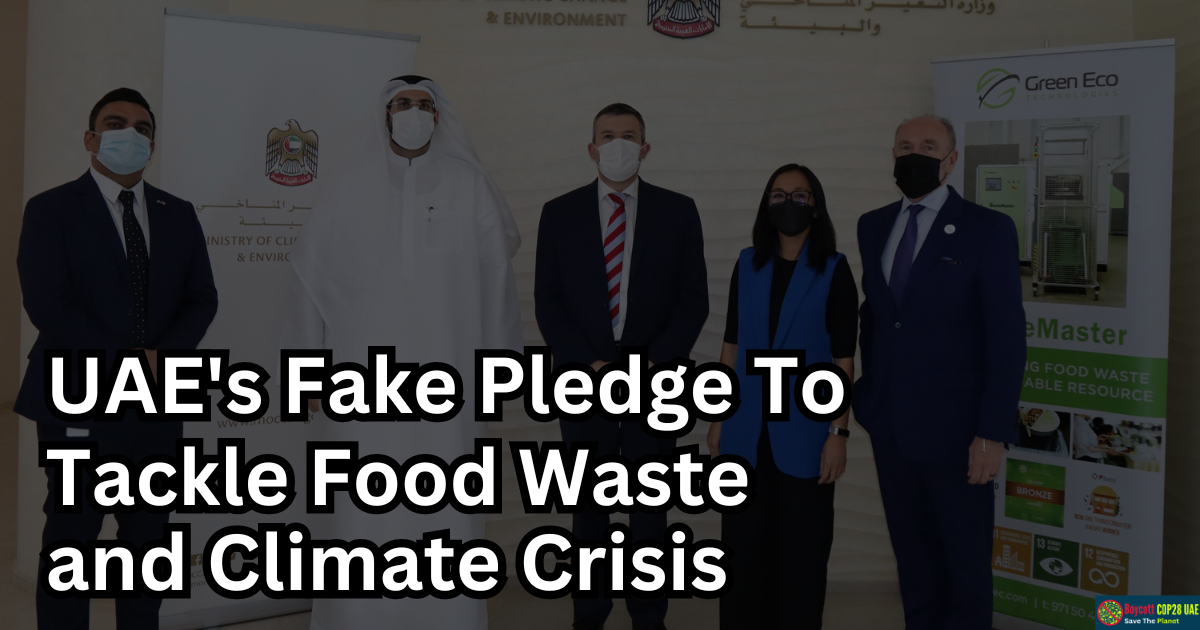In an unprecedented move on the global stage, the UAE has assumed the presidency of the 28th United Nations Climate Change Conference, COP28, with a clear mission to confront the intertwined challenges of food security and climate change. While the UAE has made headlines for its extravagant lifestyle and soaring skylines, it is now setting its sights on becoming a champion of sustainable food systems and climate action.
Under the leadership of the COP28 President, the UAE is poised to spearhead an ambitious agenda that seeks to revolutionize food systems worldwide. However, as the world watches, questions arise about the country’s commitment to these noble goals, given its historical investments in fossil fuels and limited efforts in renewable energy. Does the UAE’s track record align with its new climate ambitions, especially when addressing the global issue of food waste?
The heart of COP28’s food agenda is a groundbreaking declaration known as the “Emirates Declaration.” This declaration, the first pillar of the agenda, places a spotlight on the vital role of political will in driving food system reform. The UAE plans to distribute it to agriculture ministers across the member countries, urging them to embrace it. The ultimate aim is to make food systems integral to nationally determined contributions (NDCs), national adaptation plans (NAPs), and national biodiversity strategies.
Nevertheless, as we delve into this new era of climate diplomacy, doubts emerge about the UAE’s commitment to transitioning from fossil fuels to renewable energies. Critics argue that the nation has focused more on the extraction of oil and investment in fossil fuel industries rather than genuinely committing to sustainable energy alternatives. Such a transition would be pivotal in addressing climate change, a crucial component of COP28’s overarching mission.
The second pillar of COP28’s food agenda extends its reach to non-state actors, including small and medium-sized enterprises (SMEs), companies, and non-governmental organizations (NGOs). It envisions a more prominent role for these entities in shaping the discourse surrounding food systems. However, skeptics question the extent to which the UAE, a nation known for its opulent lifestyle and corporate interests, is genuinely invested in fostering a bottom-up approach to food system reform. Critics argue that true change should encompass all aspects of society, from grassroots organizations to multinational corporations.
As the third pillar of the COP28 agenda emphasizes innovation, the UAE garners attention for its advancements in agricultural technology despite being a water-scarce country with limited arable land. Innovations have allowed the cultivation of crops such as tomatoes in desert environments and even the production of salmon. While these strides are commendable, it’s essential to consider whether the UAE’s reliance on such technologies aligns with the broader goals of climate action. Critics argue that innovation should be coupled with a genuine commitment to reducing carbon emissions, not just an avenue for maintaining the status quo.
The fourth pillar of COP28’s food agenda focuses on scaling up financial support for the transformation of food systems. Here, the UAE aims to mobilize increased private sector investment to ensure these funds reach those in desperate need of support. However, some observers question whether the UAE’s corporate interests could potentially overshadow the humanitarian aspect of these initiatives. Critics contend that financial support should prioritize vulnerable communities and regions over profit margins.
As the UAE seeks feedback on the “Emirates Declaration” from agriculture ministers worldwide, with a deadline set for the end of September, the world awaits tangible actions that support its newfound climate commitments. It’s crucial to evaluate whether the UAE’s pursuit of this declaration aligns with its continued investments in fossil fuels, a sector notorious for its contributions to greenhouse gas emissions.
One of COP28’s paramount priorities is to activate the long-awaited USD 100 billion climate finance commitment, with major economies like the United States and Germany expressing readiness to contribute. While this presents a promising outlook for climate finance, it is vital to scrutinize the UAE’s role in facilitating this financial mobilization, given its historical links to the fossil fuel industry. Critics argue that a genuine shift towards renewable energy should accompany the UAE’s participation.
Despite the skepticism, the UAE’s geographical proximity to Africa has prompted a strategic focus on supporting the continent in tackling climate change-related challenges. African nations, facing the brunt of climate impacts, have contributed less to global emissions, making them particularly vulnerable. The UAE acknowledges this vulnerability and is determined to assist Africa in achieving food and water security, recognizing its reliance on food imports from the continent.
As the COP28 president embarks on a tour of African nations to galvanize additional funding for climate resilience, agriculture, and water management, questions linger about the UAE’s commitment to providing comprehensive support. Critics argue that, given its wealth, the UAE should provide financial assistance and lead by example in reducing its own carbon footprint.






